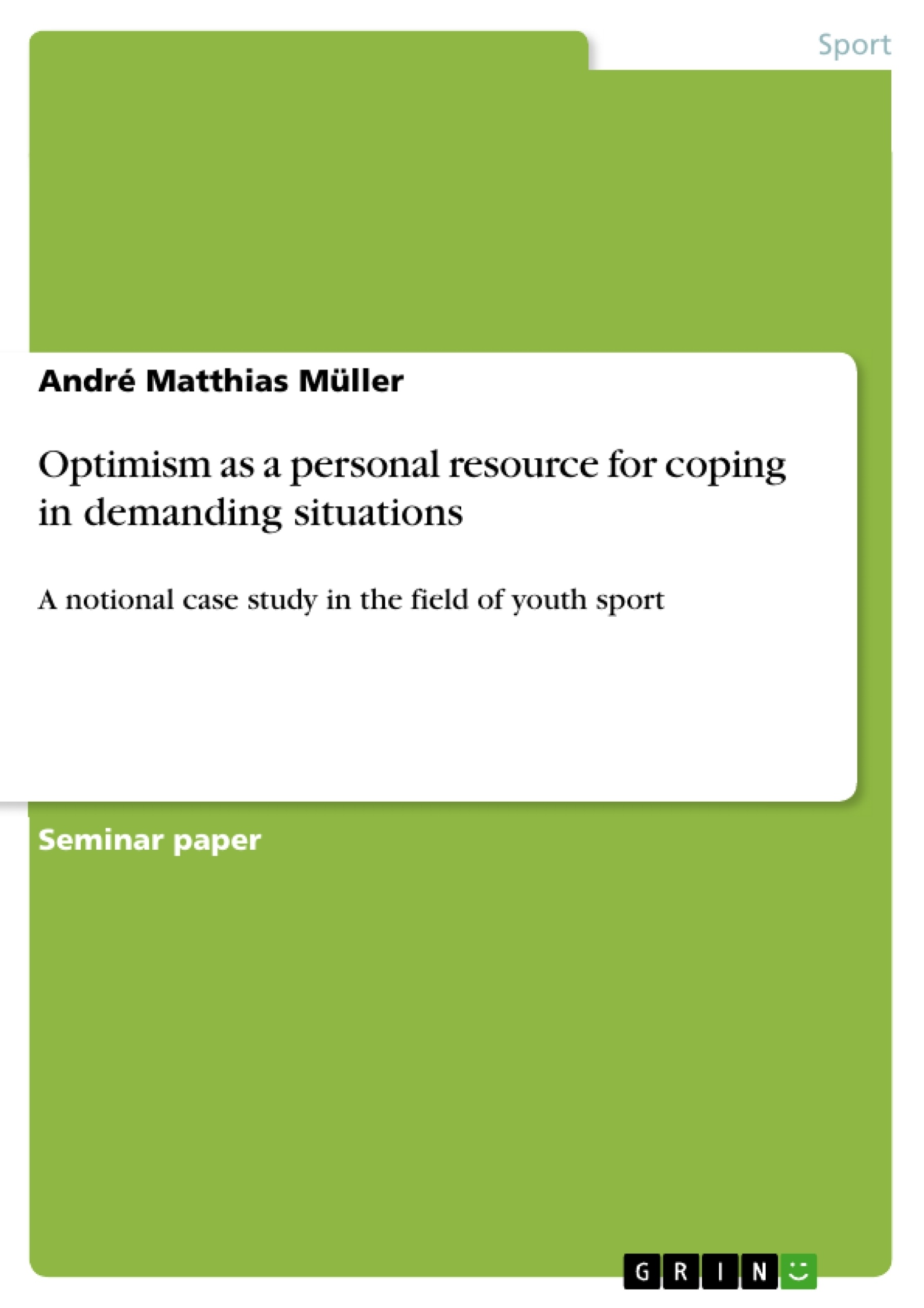Abstract
Objective: The aim of the present paper is to explain the construct of optimism in relation to coping strategies. Furthermore, we researched about the possibilities to improve situational optimism in a notional case study.
Method: Transactional theory of stress and coping by Lazarus (1982) is the initial point of this paper. We explained appraisal and coping processes and pointed out, that optimism is a needful resource to overcome demanding situations. In the following notional case study, with a young wrestler we used the Life Orientation Test (Scheier & Carver, 1994) and the CAVE-Technique to analyze optimism status. Afterwards we generated hermeneutic ideas to improve the given situational optimism status.
Results: A four stadium model, including reflection-, confirmation-, implementation- and re-evaluation phase was created to increase situational optimism. With this, it was possible to reach higher control abilities and optimism.
Conclusions: Situational optimism is improvable with the help of the given model. Therefore it is important to re-appraise the outcome to develop adaptation and transformation. Probably it is possible to transfuse situational optimism to dispositional optimism.
Inhaltsverzeichnis (Table of Contents)
- Introduction
- Theoretical Background
- Individualization as one cause of research about stressmanagement models
- Stress as an outcome of highly demanding situations
- Coping - A stressmanagement strategy
- The appraisal process
- The coping process
- Emotion focused coping
- Problem focused coping
- The personal resource optimism
- Distinction between little and big optimism
- The optimist and the pessimist
- Contra of optimism and pro of pessimism
- A notional case study in the field of youth sport
- The case
- Optimism analysis
- Implications for promoting optimism
Zielsetzung und Themenschwerpunkte (Objectives and Key Themes)
This paper aims to explain the concept of optimism in relation to coping strategies, particularly in the context of demanding situations faced by young athletes. The study explores the possibilities of improving situational optimism through a notional case study, utilizing the Transactional Theory of Stress and Coping by Lazarus (1982).
- The role of optimism as a personal resource for coping with demanding situations
- The appraisal process and its influence on stress perception
- The coping process and its two main types: emotion-focused and problem-focused coping
- The measurement of optimism using the Life Orientation Test (Scheier & Carver, 1994) and the CAVE-Technique
- Implications for promoting optimism in young athletes and their coaches
Zusammenfassung der Kapitel (Chapter Summaries)
The paper begins by introducing the concept of optimism as a valuable psychological resource, particularly relevant in the context of young athletes facing demanding situations. It establishes the theoretical foundation of the study by exploring the Transactional Theory of Stress and Coping by Lazarus (1966), emphasizing the importance of appraisal and coping processes in managing stress.
The chapter on coping strategies delves into the appraisal process, highlighting its role in determining whether a situation is perceived as stressful or not. It further discusses the two main types of coping: emotion-focused coping, aimed at managing emotional responses to stress, and problem-focused coping, which involves tackling the source of the stress directly.
The paper then focuses on the concept of optimism as a personal resource, examining the distinction between dispositional and situational optimism. It explores the characteristics of optimists and pessimists, and discusses the potential benefits and drawbacks of both perspectives.
The final section before the conclusion presents a notional case study involving a young wrestler, aiming to analyze her level of optimism using the Life Orientation Test and the CAVE-Technique. The study explores the possibilities for promoting optimism in this individual, highlighting the importance of coach-athlete relationships in fostering a supportive and optimistic environment.
Schlüsselwörter (Keywords)
This paper focuses on the concepts of optimism, coping, stress management, appraisal process, emotion-focused coping, problem-focused coping, Life Orientation Test, CAVE-Technique, young athletes, and the role of coaches in promoting optimism.
Frequently Asked Questions
How does optimism assist in coping with demanding situations?
Optimism is a psychological resource that helps individuals re-appraise stressful situations, leading to better adaptation and transformation.
What is the Transactional Theory of Stress and Coping?
Developed by Lazarus, it views stress as an outcome of the appraisal process, where an individual evaluates a situation's demands against their resources.
Can situational optimism be improved?
Yes, the paper presents a four-stadium model (reflection, confirmation, implementation, re-evaluation) to increase situational optimism.
What tools are used to analyze optimism in the case study?
The study utilizes the Life Orientation Test (LOT) and the CAVE-Technique to assess the optimism status of a young athlete.
What is the difference between dispositional and situational optimism?
Dispositional optimism is a stable personality trait, while situational optimism refers to expectations regarding a specific event or context.
- Citation du texte
- Bachelor of Arts André Matthias Müller (Auteur), 2009, Optimism as a personal resource for coping in demanding situations, Munich, GRIN Verlag, https://www.grin.com/document/177263



